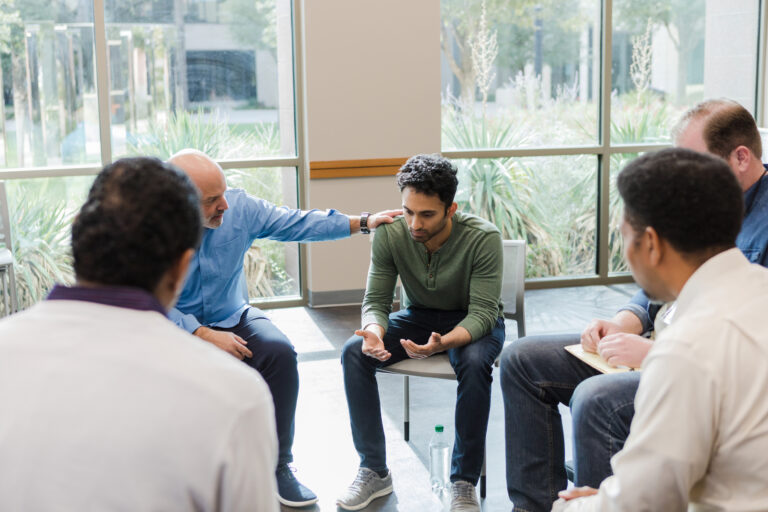What Are the Different Types of Addiction Intervention? When addiction takes hold of someone we love, it can feel like our entire world is falling apart. But we want you to know: there’s hope. At Change Institute, we believe that intervention is not just about breaking through denial—it’s about building a path to healing for the entire family.
Led by our founder, Brad Lamm, our team specializes in on-site intervention services that are designed to meet families exactly where they are—literally and emotionally. Whether you’re facing a crisis or preparing for the next step, we’re here to guide you with compassion, clarity, and proven strategies.
What We Mean by Addiction Intervention
An addiction intervention, as we see it, is more than a serious conversation—it’s a structured, loving act of care. We help families create a space where the truth can be shared without shame, and where real change becomes possible.
Intervention is about showing someone they’re not alone and that help is readily available. And with our experienced team by your side, you don’t have to navigate that journey by yourself.
Why Interventions Are So Important
We’ve seen firsthand how addiction isolates not just individuals, but entire families. Denial becomes a wall, and fear keeps everyone silent. That’s where we come in.
By leading families through the intervention process, we help break down those walls and reconnect people to one another. Our on-site intervention services are specifically designed to make this crucial step accessible to families who might otherwise hesitate due to cost or logistical constraints.
Different Types of Addiction Intervention We Offer at Change Institute
At Change Institute, we understand that no two situations are exactly alike. That’s why our team—led by Brad Lamm—offers a wide range of tailored intervention services that we bring directly to families, wherever they’re needed. Here’s a closer look at the five most common types of interventions we specialize in:
1. Alcohol Intervention
Alcohol misuse can quietly devastate lives and relationships. It’s legal, socially accepted, and easy to hide, making it one of the most difficult addictions to confront. We’ve helped countless families navigate the complexities of alcohol use disorder with clarity, compassion, and structure.
What we focus on:
- Identifying high-functioning alcoholism, binge drinking, or chronic dependency
- Helping families move past fear and normalize the need for help
- Offering on-site alcohol interventions with same-day support when needed
- Presenting real-time treatment options, including detox, outpatient, and long-term recovery programs
Why this matters: Many people with alcohol addiction believe they can “manage” it on their own. Our job is to show them that life doesn’t have to be managed—it can be fully lived, sober and supported.
2. Eating Disorder Intervention
Disorders like anorexia, bulimia, and binge eating are often rooted in trauma, control, and shame. Families usually feel helpless as they watch their loved one suffer in silence. With Brad Lamm’s background and long-standing work in this area, we bring a compassionate and clinically informed approach to eating disorder interventions.
What we offer:
- Trauma-informed intervention planning that respects sensitivity and emotional triggers
- On-site support for families who need help creating a safe space for truth-telling
- Coordination with specialized eating disorder treatment programs
- Education on disordered eating, co-occurring disorders, and recovery timelines
Why this matters: Eating disorders have the highest mortality rate of all mental health diagnoses. But with the right intervention—led gently and wisely—healing is possible. We ensure your family doesn’t have to face this alone.
3. Mental Health Crisis Intervention
When someone is experiencing a mental health crisis—like psychosis, mania, suicidal ideation, or extreme emotional dysregulation—it’s hard to know what to do next. That’s where we lean into the realities of what is happening on the ground to appropriately step in and respond with power..
How we help:
- Rapid, on-site intervention response—we come to the home, hospital, workplace, or community space
- Safety assessments and stabilization protocols
- Coordination with EMS, hospitals, or psychiatric programs, if needed
- Support for the whole family, including boundary-setting and aftercare
Why this matters: Mental health crises are unpredictable, but our response doesn’t have to be. We’re trained to bring calm into chaos—and we do it affordably, without the long waitlists or red tape.
4. Drug Intervention
When a loved one is using drugs—whether it’s opioids, stimulants, benzodiazepines, or synthetic substances—it can feel like they’ve been taken over by someone else. Our drug intervention services are designed to reconnect the person to their family, their goals, and their future.
What we focus on:
- Addressing both recreational and dependent drug use
- Creating urgency before an overdose or irreversible event happens
- Providing community-based intervention support
- Offering detox placement and safe transport to an assessment, inpatient, or outpatient programs
Why this matters: Every day we wait is another day of risk. We offer a structured, loving process that respects your loved one’s humanity while confronting the reality of addiction.
5. Substance Use Intervention (Poly-Substance or Blended Addiction)
Often, addiction doesn’t fall into a single category. Your loved one might drink and use pills, or alternate between meth and alcohol. We specialize in interventions for poly-substance use, where the complexity of the situation can overwhelm even the most informed family.
How we help:
- Holistic evaluation of all substances involved and how they interact
- Clarification of what’s driving the use (trauma, mental illness, chronic pain)
- Matching with treatment centers that are equipped to handle co-occurring diagnoses
- Building a custom plan for intervention, stabilization, and long-term support
Why this matters: The more complicated the case, the more vital it is to act with precision and compassion. We don’t treat substance use like a checkbox—we create a plan for the whole person.
When to Consider an Intervention
If you’re noticing any of the following signs, it might be time to take the next step:
- Lying or secrecy around substance use
- Sudden or even subtle changes in behavior or mood
- Ignoring work, family, or personal health
- Legal trouble or financial stress
- Failed promises to quit or cut down
At Change Institute, we offer affordable consultations to help you assess your situation and decide the best path forward.
How Our Interventions Work
Here’s how we walk with you through the process:
Step 1: Preparation
We sit down with your family to create a clear plan. This includes:
- Building the right intervention team and prepping for the invitational intervention
- Developing personal talking points for your loved one, that communicate each participant’s eyewitness accounts
- Discussing care/treatment options and setting boundaries
Step 2: The Intervention Meeting
Our trained interventionist leads the conversation in a respectful and hopeful manner. The intervention team gets to share the truth with love and without blame, and with humor, even. “There is more love and laughter at my interventions over the two decades in this work than acrimony, and I continue to be amazed by that,” Brad Lamm has said.
We also present immediate help options—usually a short-stay assessment, an inpatient or outpatient program—and explain what happens if the loved one refuses help initially.
Step 3: Follow-Up and Support
Our support doesn’t stop at the intervention. We continue to guide your family through:
- Admitting your loved one into treatment
- Embracing hope while pushing aside fear
- Holding boundaries with care and consistency
- Attending our family support Family Class sessions virtually
- Adjusting the plan as needed
Everything we do is designed to be affordable and accessible because we know how important it is to act quickly and thoughtfully.
Why On-Site Support Makes the Difference
One of the things that sets us apart is our commitment to on-site services. We don’t wait for your loved one to come to us — we go to them. When a loved one who suffers says NO WAY, we see that as a conversation starter to help. We are flexible, while usually meeting at the first caller’s or a suffering loved one’s home. At times, we meet first at a hospital or workplace. We deliver the help where it’s needed.
Here’s why that matters:
- Intervening creates urgency and real connection
- Intervening keeps everyone safer during high-stress moments
- Intervening makes the logistics of help possible, as barriers pop up
We’re proud to offer real-time support that empowers families to act instead of waiting for things to get worse.
Family Healing: An Essential Part of Recovery
Addiction doesn’t just hurt the person suffering from substance use. It affects all of us—siblings, parents, spouses, children. That’s why our services are client-centered.
We support your family and friends by:
- Providing education on addiction and recovery
- Offering group coaching and therapy referrals
- Helping everyone understand boundaries and healthy roles
- Staying involved long after the intervention is done
We don’t just want your loved one to recover—we want your family to thrive.
Intervention Is a First Step — Not the Last
It’s important to remember that even the best intervention is happening since the your loved one who suffers has said NO to help. We see NO as the conversation starter to our intervention work. Real change takes professional help, time, support, and a community that doesn’t give up.
We welcome NO as the starting point. NO is okay. We use the evidence-based invitational intervention which is organized to support conversation, build autonomy, and offer hope in the face of crisis. The conversation still plants a seed, and we’ll help you stay strong and hopeful.
Why Choose Change Institute?
With Brad Lamm’s leadership, we’ve helped thousands of families start their healing journey. What sets us apart is our:
- High-impact services
- On-site, in-person trauma-informed interventions
- Deep understanding of mental health, addiction and family systems
- Long-term support and coaching
We’re not just an intervention provider—we’re your partner in long-term recovery.
Contact Change Institute Today – Let’s Take the First Step Together
If your loved one is struggling and you don’t know where to turn, we’re here for you. At Change Institute, we offer affordable, compassionate, and effective intervention services that bring hope back into focus.
You don’t have to do this alone. Contact us today and let’s build a plan that brings your family one step closer to healing.








